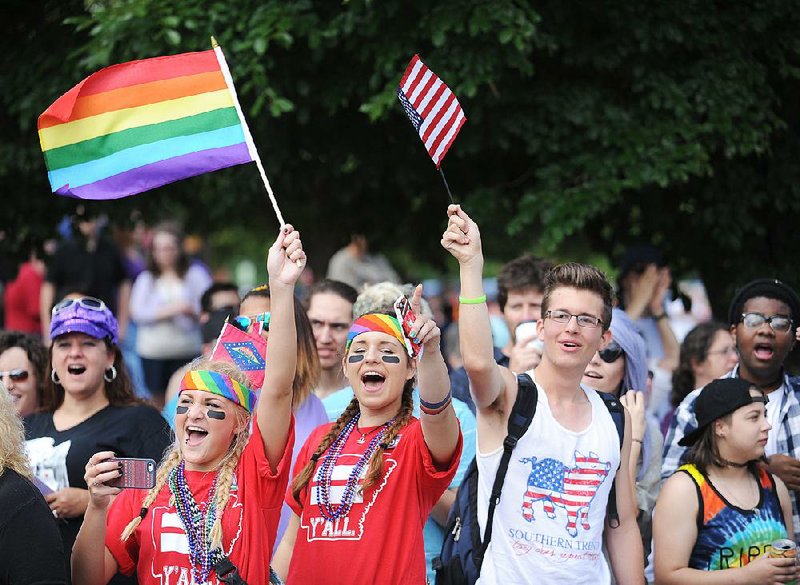WASHINGTON -- State politicians say the U.S. Supreme Court's decision Friday striking down bans on same-sex marriage will be a campaign issue in 2016, but they won't know if it's an effective one until votes are cast.
Arkansas voters have traditionally opposed gay marriage. In 2004, nearly 75 percent of Arkansas voters approved an amendment to the state constitution defining marriage as a union between one man and one woman.
Arkansas Gov. Asa Hutchinson and Attorney General Leslie Rutledge said Friday that the state will obey the court's 5-4 ruling in Obergefell v. Hodges, even if they don't agree with it. Many county clerks immediately began issuing marriage licenses to same-sex couples.
The Arkansas Poll has shown that opposition to any legal recognition of gay relationships has declined very gradually from 54 percent in 2005 to 48 percent in 2014.
University of Arkansas at Fayetteville political science professor Janine Parry, who has directed the poll since its inception in 1999, said that figure shouldn't be surprising.
"As the rest of the country was moving, Arkansas was just stationary and that's not out of step with our history. We're hardly early adopters, that's not our way, it's not our reputation," she said. "Arkansans for the most part are traditionalists. We're very good at sticking with what we know."
Arkansans have never told the pollster that same-sex marriage is the most pressing issue in the state. Instead, they are consistently concerned about education, the economy and health care, she said.
"It just never makes the list," she said. "So, I think some people will grumble and there will be some jokes and some grimaces, but I have a feeling most Arkansans will just move on."
That's what state House of Representatives Democratic leader Eddie Armstrong of North Little Rock is hoping happens. He said in recent elections Republicans successfully convinced voters that the Patient Protection and Affordable Care Act was going to hurt the average person, and he expects they'll try to convince 2016 voters that the gay-marriage ruling harms them, too.
"I'm hopeful that Arkansans take a pause and really vote in the next election cycle based off what they truly think is good for the state of Arkansas. This is a human-rights issue that we're faced with, not a states rights issue, and if we are focusing on what's good for the state of Arkansas, they won't get bogged down with all the rhetoric that got people convinced once before that Obamacare was going to drive us in the ground and our state was never going to be the same again," he said.
Arkansas House Republican leader Ken Bragg of Sheridan said Republicans will emphasize the ruling as they seek votes.
"This will continue to define the differences in the parties, what they believe, much like Obamacare did," Bragg said. "The conservatives were staunchly against it and the liberal factions were for it and I think this will further define what the parties stand for."
Parry disagreed with the idea that same-sex marriage would be a flash point for conservatives the way the Affordable Care Act was.
"Obamacare is an economic policy with far-reaching effects for every American family, good or bad," she said. "But this is very unlikely to have the same negative reverberations for the Democratic brand. It's a social issue but mainly it's just not salient for most Arkansans. People don't volunteer it as something that is keeping them up at night."
Ouachita Baptist University professor Hal Bass said how much voters care may depend on what political and religious leaders do.
"What I'll be looking at is the reaction of leadership, the reaction of elites and see the kind of direction they provide for the public here in Arkansas," he said. "Is it going to be kind of resigned acceptance, you know, shrug your shoulders, it's the law of the land, or is it going to be some sense of attempted resistance, defiance, something like that?"
Former Arkansas Gov. Mike Huckabee lambasted the "unconstitutional judicial tyranny" of the ruling, saying in a statement, "This ruling is not about marriage equality, it's about marriage redefinition."
Other GOP presidential candidates were more subdued. Former Florida Gov. Jeb Bush said in a statement, "The Supreme Court should have allowed the states to make this decision. I also believe that we should love our neighbor and respect others, including those making lifetime commitments."
Greg Shufeldt, an assistant professor of political science at the University of Arkansas at Little Rock, said the 12 announced Republican candidates are trying to differentiate themselves from one another.
"The rhetoric from Gov. Huckabee today are the types of things you would say if you're in an extremely contested Republican primary and need to appeal to a certain segment of a population," Shufeldt said. "But I don't know that those comments would necessarily be consistent or be beneficial in a general election."
Comments by former Secretary of State Hillary Rodham Clinton were more aligned with a presidential candidate who is well known and not facing tough competition, he said.
"Today is one of those days we'll tell all our grandchildren about," Clinton said in a statement Friday. "This is our country at its best: inclusive, open and striving towards true equality."
Shufeldt said he expects the majority of Arkansans to vote for Republicans in 2016, regardless of who the nominees are or how many same-sex couples get marriage licenses.
"It seems unlikely that Arkansas would be in play," he said.
The ruling may increase the distance between conservative Southern voters and the national Democratic Party, he added.
SundayMonday on 06/28/2015


